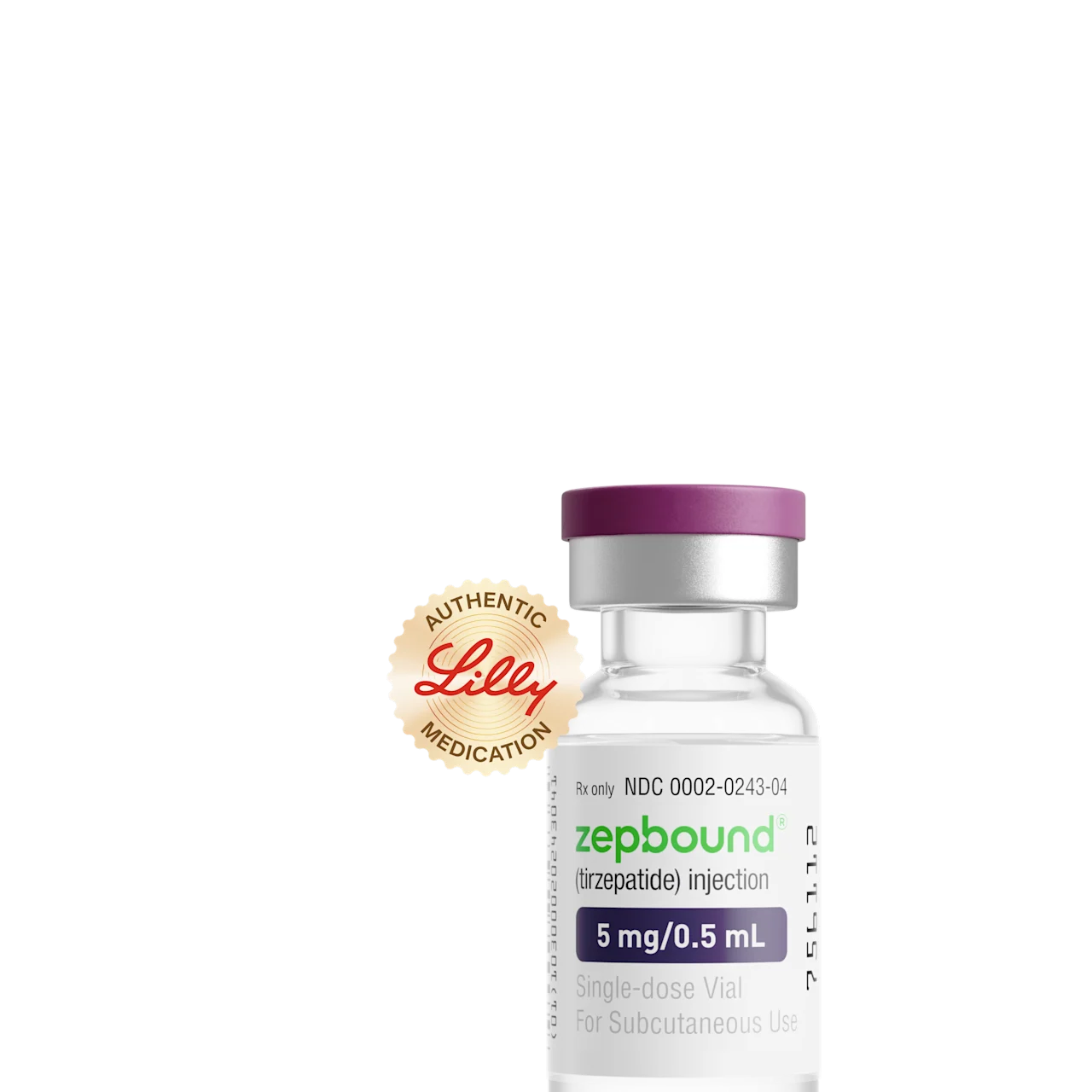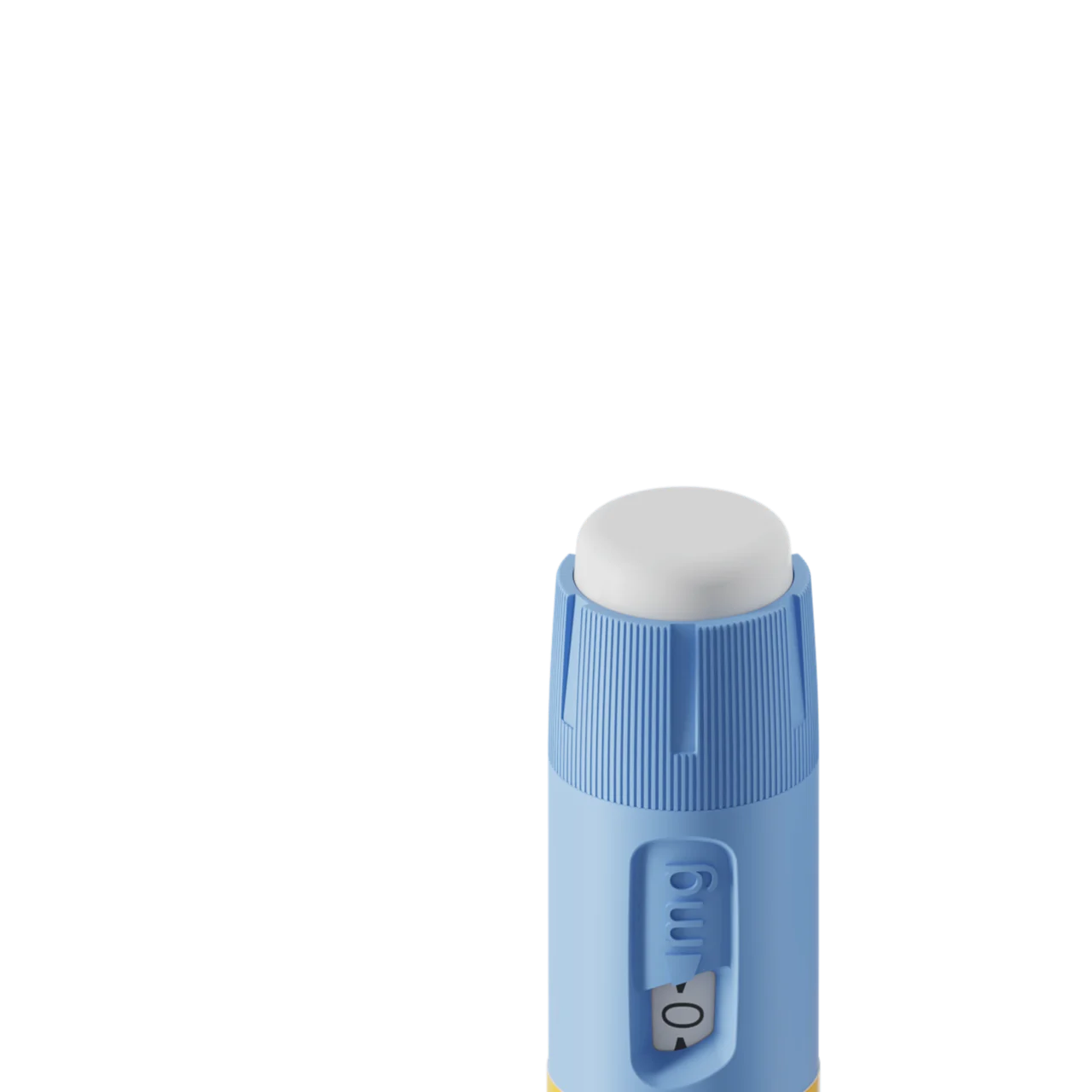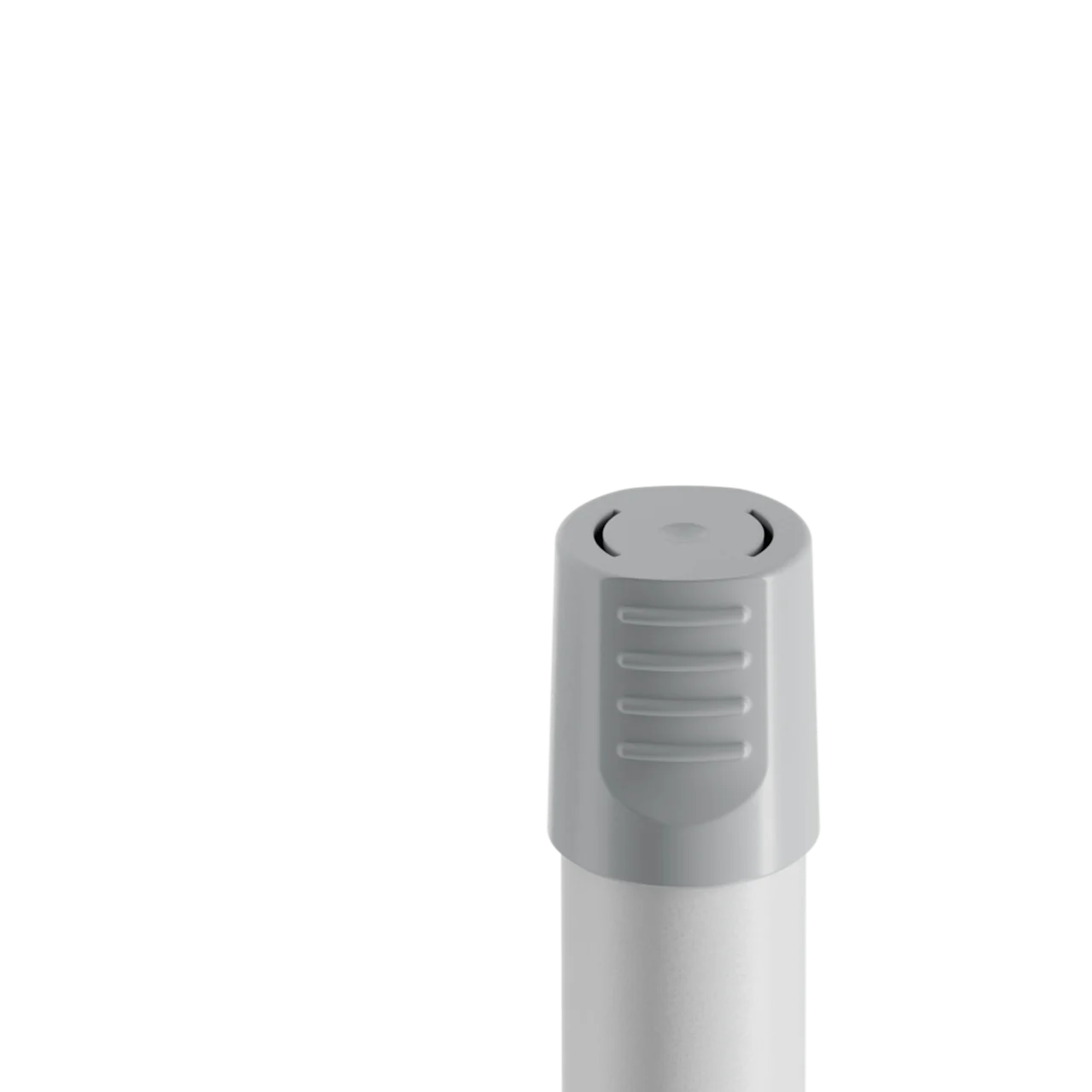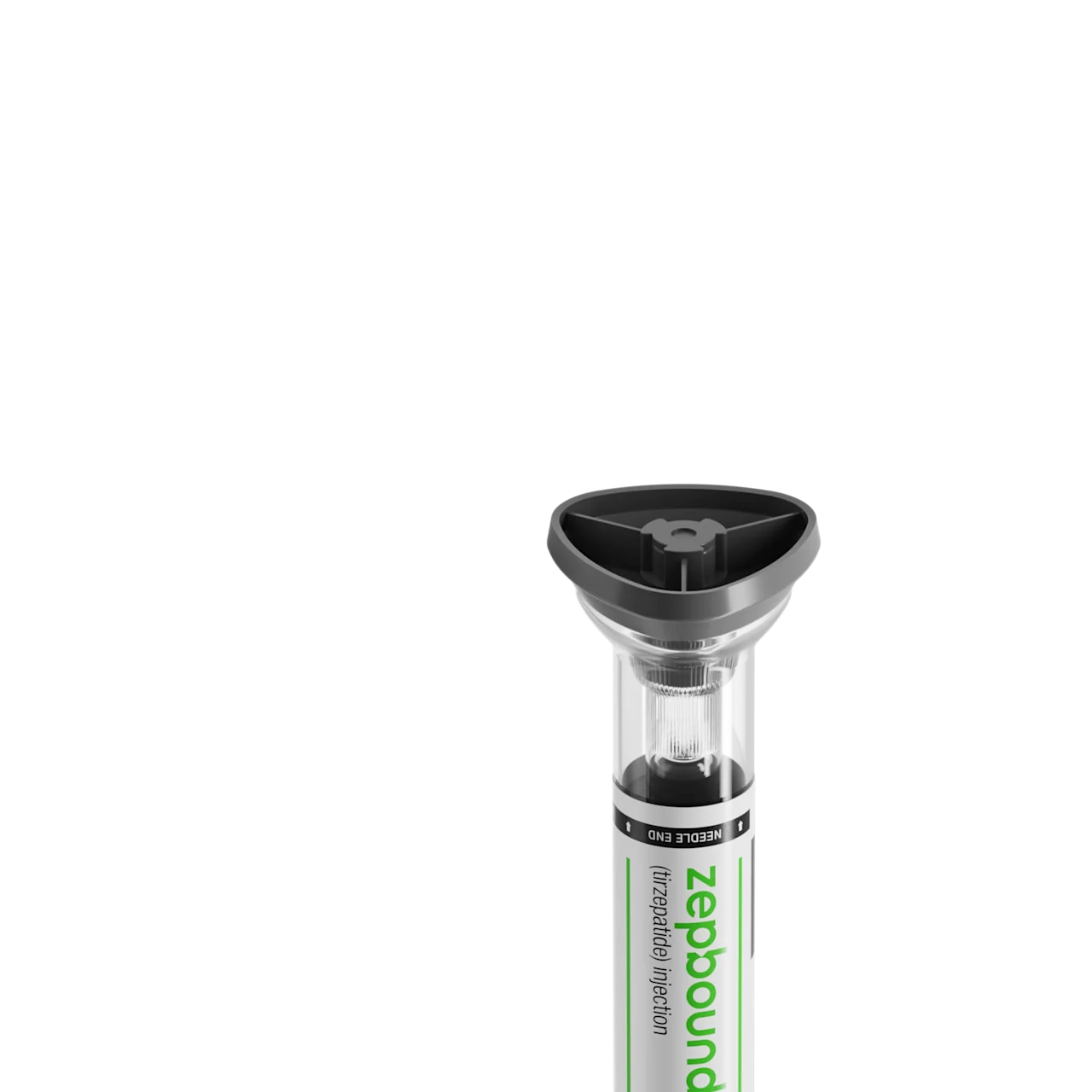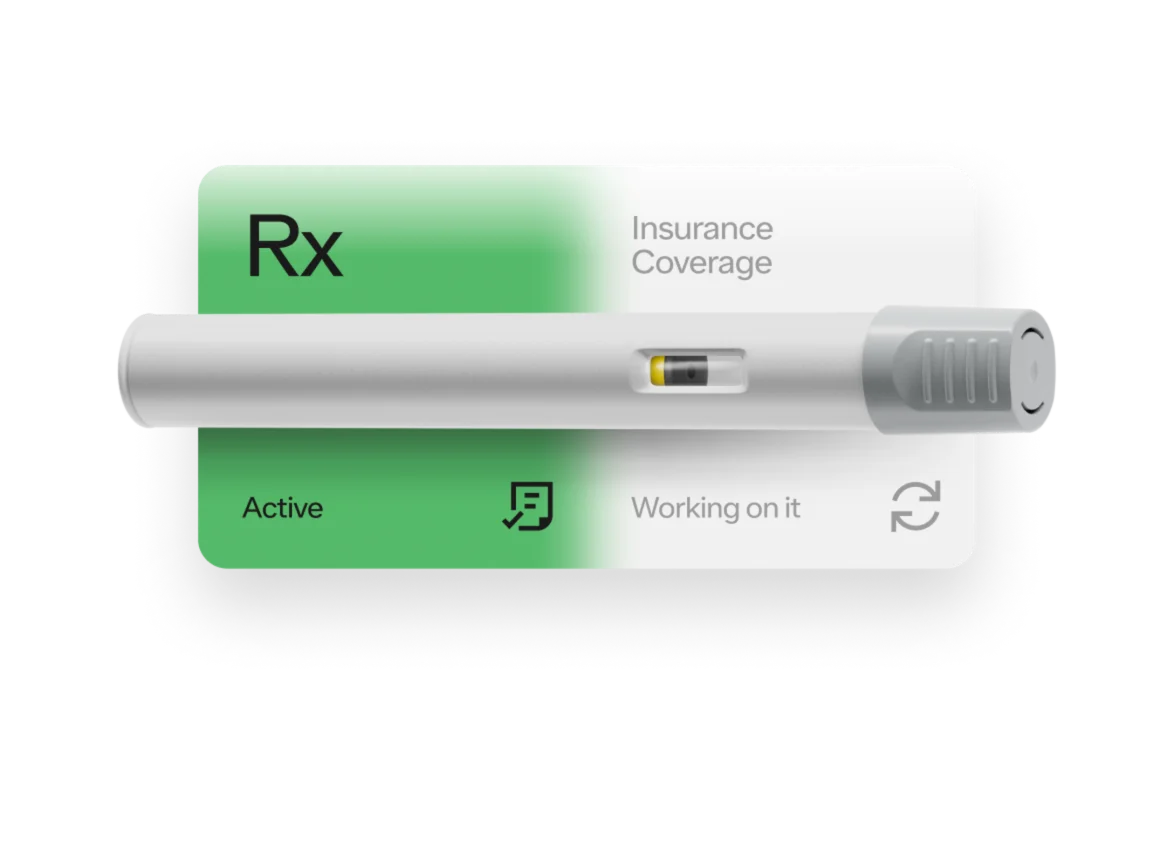Key takeaways
Zepbound is a GLP-1/GIP receptor agonist used for weight loss in people with overweight and obesity that can cause gastrointestinal side effects like constipation.
In a SURMOUNT-4 clinical trial, up to 20.7% of Zepbound users reported constipation during the early phase of treatment, but symptoms typically improved as their bodies adjusted to the medication.
Lifestyle changes, like increasing water intake, regular physical activity, and eating more fiber-rich foods, can help manage Zepbound constipation.
Here's what we'll cover
Key takeaways
Zepbound is a GLP-1/GIP receptor agonist used for weight loss in people with overweight and obesity that can cause gastrointestinal side effects like constipation.
In a SURMOUNT-4 clinical trial, up to 20.7% of Zepbound users reported constipation during the early phase of treatment, but symptoms typically improved as their bodies adjusted to the medication.
Lifestyle changes, like increasing water intake, regular physical activity, and eating more fiber-rich foods, can help manage Zepbound constipation.
When starting or considering a weight loss and management medication like Zepbound (tirzepatide), it’s natural to wonder about possible side effects—especially those that might disrupt your day-to-day life, like constipation. Zepbound constipation is a side effect some users report, but how common is it, and why does it happen?
In a clinical trial, up to 20.7% of participants experienced constipation during the beginning of their treatment. This may not be all that surprising given Zepbound is part of the GLP-1/GIP receptor agonist class of drugs that are designed to support weight loss in adults with obesity or overweight and weight-related health conditions. And like other GLP-1-based weight loss treatments, the injectable prescription medication mimics hormones that regulate appetite, digestion, and metabolism and can often cause gastrointestinal side effects, such as nausea, diarrhea, vomiting, and, yup, constipation.
Let’s explore what the science says about how Zepbound contributes to constipation, how long it might last, and other common side effects you might experience while taking the drug.
Does Zepbound cause constipation?
Yes, Zepbound can cause constipation. Like other weight loss medications, Zepbound affects the digestive system. It slows gastric emptying, increasing the time food spends in the stomach, which helps you feel full for longer after you eat. While this can be a benefit for those hoping to lose weight, it can also lead to gastrointestinal side effects, such as constipation.
Constipation is a commonly reported side effect in clinical trials, particularly during the early stages of treatment. As mentioned above, in a SURMOUNT-4 clinical trial, 20.7% of participants reported constipation during the initial Zepbound treatment phase (36 weeks or about nine months). Zepbound users generally experienced mild-to-moderate constipation that typically decreased over time as participants continued the medication.
In a review of six clinical trials, 2.54% of participants with type 2 diabetes experienced constipation while taking tirzepatide (the active ingredient in Zepbound). The study also found that the likelihood of experiencing constipation increased with higher doses of the medication, such as 10 mg or 15 mg.
While not everyone experiences constipation on Zepbound, it’s a notable side effect for some users, and its likelihood may depend on individual tolerance and dosage. If you experience persistent or severe constipation, consulting a healthcare provider can help address the issue.
How long does constipation on Zepbound last?
It’s difficult to say with certainty how long constipation on Zepbound lasts, as no studies have focused on this specific issue. However, research shows that most gastrointestinal side effects typically improve over the first few months. So, if you experience constipation after starting Zepbound, you can take solace in knowing that your bowel movements should likely return to normal as your body adjusts to the medication or increased doses.
Looking at other weight loss injections might offer more insight. For example, studies on Wegovy (semaglutide) showed that constipation typically lasted around 47 days and leveled off by week 10.
This doesn’t mean that you have to just wait for constipation to go away on its own. Instead, staying hydrated, eating more fiber, and staying active can help manage symptoms and keep it from interfering with your daily life. If the issue persists, it’s a good idea to talk to your healthcare provider to discuss how to manage Zepbound constipation.
Why does Zepbound cause constipation?
It’s unclear why tirzepatide, the active ingredient in Zepbound, causes digestive side effects, but it likely relates to how the medication impacts the digestive system.
As mentioned above, tirzepatide slows gastric emptying, the process of food moving from the stomach into the intestines. When food remains in the stomach, it helps you feel fuller for longer after eating, potentially reducing overall calorie intake. However, this delay in digestion may also slow how food moves through the intestines and contribute to constipation. When the gut slows down, bowel movements can become less frequent.
Healthcare providers often stress the importance of staying hydrated while taking Zepbound because the medication’s appetite-suppressing effects can lead to reduced fluid intake. Dehydration increases the risk of constipation, as it causes stool to become harder to pass, compounding the digestive symptoms some people experience on Zepbound.
Changes in dietary habits may also contribute to Zepbound constipation. People taking Zepbound may eat less fiber because they’re consuming less food overall or because high-fiber foods can worsen other side effects, such as bloating or nausea. Fiber is essential for adding bulk to stool and promoting regular bowel movements; inadequate fiber intake can cause or worsen constipation.
How to relieve constipation on Zepbound
Constipation on Zepbound can be frustrating, but it’s usually manageable with a few simple lifestyle adjustments.
Increase your fluid intake
Staying hydrated is one of the best ways to prevent and relieve constipation. As digested food and waste move through the gut, the large intestine absorbs water. Without adequate hydration, stool can become hard, dry, and difficult to pass. Since Zepbound reduces appetite, you may be less inclined to keep up with fluids throughout the day. So, it’s important to make a conscious effort to drink more H2O.
Drinking plenty of water will keep your stool soft and help it move through the intestines. Experts generally recommend drinking 9–13 cups of water daily. If you’re not a fan of plain, still water, consider other calorie-free fluids like herbal teas or sparkling water.
Eat more fiber-rich foods
Dietary fiber is important for bowel movement regularity and stool consistency. There are two types of fiber: soluble and insoluble. The former helps soften stool by retaining water, making it easier to pass, while the latter adds bulk to stool and speeds up the passage of food through the gastrointestinal tract. This promotes more frequent and consistent bowel movements.
Incorporating fiber-rich foods into your diet—fruits, vegetables, whole grains, and legumes—can help relieve constipation and support overall digestive health, making it an essential component of a balanced diet. If you experience nausea or bloating while increasing your fiber intake, start slowly and choose options that tend to be gentler on the gut, such as cooked vegetables or oatmeal.
Too much fiber may cause constipation as well, so be sure to seek advice from a healthcare professional such as a registered dietitian nutritionist if you want recommendations tailored specifically to you.
Stay physically active
Physical activity is an integral part of any weight loss plan, and Zepbound works best when combined with a reduced-calorie diet and regular exercise. Together, these lifestyle changes can help enhance the medication’s effects on weight management while supporting your overall wellbeing.
Exercise can also help relieve constipation. Engaging in aerobic physical activity, like walking, swimming, or cycling, can stimulate the muscles in your digestive tract, improving intestinal motility (movement), which encourages bowel movements. For those on Zepbound, incorporating regular movement into your daily routine is especially important to counteract the slower gut movement that can contribute to constipation. Starting with short walks after meals or gentle stretches can make a noticeable difference in supporting regularity.
Consider over-the-counter treatments
If lifestyle changes aren’t enough, over-the-counter (OTC) treatments like osmotic laxatives, stool softeners, or fiber supplements can provide relief. Polyethylene glycol powder like Miralax is an osmotic laxative; it is typically consumed with 8 oz of water and works by drawing water into the intestines to help move stool along. OTC stool softeners like Colace (docusate sodium) help by adding moisture to the stool, making bowel movements easier to pass.
If you struggle to get enough fiber through diet alone, supplements like Metamucil, which contains psyllium husk, can add bulk to stool and improve bowel movements. Always consult a healthcare provider before starting any new medication or supplement to ensure its safety.
Rx weight loss with Ro
Get access to prescription weight loss medication online
When to contact a healthcare provider
While constipation on Zepbound is often mild and manageable, it’s essential to see a healthcare provider if it is severe or persistent or when at-home treatments are ineffective. Symptoms like worsening abdominal pain, bloating, or difficulty passing stool for three or more days require medical attention to prevent serious issues like intestinal obstruction (when stool gets stuck in the intestine).
If Zepbound constipation is affecting your quality of life, speak with your healthcare provider. They may suggest adjusting your Zepbound dosage, switching medications altogether, exploring other potential causes of constipation, or, in some cases, offering prescription medication to treat constipation.
Bottom line
Like all prescription medications, Zepbound can come with a list of side effects. As for constipation, in particular? Let’s recap:
Zepbound may cause constipation, but it tends to be manageable. In clinical trials, up to 20.7% of participants reported experiencing the side effect while taking the medication. And though it can be uncomfortable, symptoms usually improve over time as the body adjusts to the medication.
Zepbound slows gastric emptying and gut motility (movement), which helps with appetite reduction and weight loss but can lead to less frequent bowel movements. Decreased fluid and fiber intake can also contribute to constipation.
Gastrointestinal side effects of Zepbound have been shown to be dose-dependent. They tend to occur most frequently when starting the medication or at higher doses and are typically mild to moderate and temporary.
Lifestyle changes can help manage side effects. Drinking more water, eating fiber-rich foods, eating smaller meals, and staying active can ease constipation and other gastrointestinal symptoms.
If constipation and other Zepbound side effects interfere with daily life or don’t improve with lifestyle changes, talk to a healthcare provider. They may adjust your dosage or recommend additional treatments.
Frequently asked questions (FAQs)
Does Zepbound cause diarrhea?
Yes, diarrhea is a common gastrointestinal side effect of Zepbound and is slightly more common than constipation. In the first 36 weeks of treatment, 21.1% of clinical trial participants experienced diarrhea, while 20.7% had constipation. Most cases were mild-to-moderate and became less frequent over time as participants adjusted to the medication.
What are the most common side effects of Zepbound?
The most common side effects of Zepbound include nausea, vomiting, decreased appetite, dyspepsia (indigestion), constipation, and diarrhea. These side effects are typically most noticeable when starting the medication or after increasing the dosage. For most people, gastrointestinal side effects improve over time as the body adjusts to the medication and its impact on the gastrointestinal system.
How can you reduce Zepbound side effects?
Minor lifestyle adjustments can help reduce Zepbound side effects. Experts generally recommend:
Eating smaller, more frequent meals rather than three large meals
Increasing intake of whole, nutrient-dense foods and limiting intake of processed or greasy foods
Maintaining hydration by drinking plenty of water or calorie-free fluids
Staying physically active can also help improve overall digestion and reduce the likelihood of experiencing constipation.
Does Mounjaro cause constipation?
Yes, Mounjaro can cause constipation. As a GLP-1/GIP receptor agonist, Mounjaro slows down the emptying of the stomach and gut motility, which can lead to symptoms like bloating and difficulty passing stool. Clinical studies show that constipation is a common Mounjaro side effect. However, it is usually mild to moderate in severity and tends to improve over time as the body adjusts to the medication.
DISCLAIMER
If you have any medical questions or concerns, please talk to your healthcare provider. The articles on Health Guide are underpinned by peer-reviewed research and information drawn from medical societies and governmental agencies. However, they are not a substitute for professional medical advice, diagnosis, or treatment.
Zepbound Important Safety Information: Read more about serious warnings and safety info.
Wegovy Important Safety Information: Read more about serious warnings and safety info.
References
Aronne, L. J., Sattar, N., Horn, D. B., et al. (2024). Continued Treatment With Tirzepatide for Maintenance of Weight Reduction in Adults With Obesity: The SURMOUNT-4 Randomized Clinical Trial. JAMA, 331(1), 38–48. doi: 10.1001/jama.2023.24945. Retrieved from https://pubmed.ncbi.nlm.nih.gov/38078870/
Barber, T. M., Kabisch, S., Pfeiffer, A. F. H., & Weickert, M. O. (2020). The Health Benefits of Dietary Fibre. Nutrients, 12(10), 3209. doi: 10.3390/nu12103209. Retrieved from https://pubmed.ncbi.nlm.nih.gov/33096647/
Chang, L., Chey, W. D., Imdad, A., et al. (2023). American Gastroenterological Association-American College of Gastroenterology Clinical Practice Guideline: Pharmacological Management of Chronic Idiopathic Constipation. The American Journal of Gastroenterology, 118(6), 936–954. doi: 10.14309/ajg.0000000000002227. Retrieved from https://pmc.ncbi.nlm.nih.gov/articles/PMC10544839/
Christensen, S., Robinson, K., Thomas, S., & Williams, D. R. (2024). Dietary intake by patients taking GLP-1 and dual GIP/GLP-1 receptor agonists: A narrative review and discussion of research needs. Obesity Pillars, 11, 100121. doi: 10.1016/j.obpill.2024.100121. Retrieved from https://pmc.ncbi.nlm.nih.gov/articles/PMC11340591/
Diaz, S., Bittar, K., Hashmi, M. F., & Mendez, M. D. (2023). Constipation. StatPearls. Retrieved from https://pubmed.ncbi.nlm.nih.gov/30020663/
Karrar, H. R., Nouh, M. I., Nouh, Y. I., et al. (2023). Tirzepatide-Induced Gastrointestinal Manifestations: A Systematic Review and Meta-Analysis. Cureus, 15(9), e46091. doi: 10.7759/cureus.46091. Retrieved from https://pmc.ncbi.nlm.nih.gov/articles/PMC10614464/
Kiela, P. R. & Ghishan, F. K. (2016). Physiology of Intestinal Absorption and Secretion. Best practice & research. Clinical Gastroenterology, 30(2), 145–159. doi: 10.1016/j.bpg.2016.02.007. Retrieved from https://pmc.ncbi.nlm.nih.gov/articles/PMC4956471/
Kim, Y. S., Song, B. K., Oh, J. S., & Woo, S. S. (2014). Aerobic exercise improves gastrointestinal motility in psychiatric inpatients. World Journal of Gastroenterology, 20(30), 10577–10584. doi: 10.3748/wjg.v20.i30.10577. Retrieved from https://pmc.ncbi.nlm.nih.gov/articles/PMC4130869/
Mathew, A. & Hannoodee, H. (2023). FRI643 Tirzepatide Associated Partial Small Bowel Obstruction: A Case Report. Journal of the Endocrine Society, 7(Suppl 1), bvad114.862. doi: 10.1210/jendso/bvad114.862. Retrieved from https://pmc.ncbi.nlm.nih.gov/articles/PMC10554206/
McRorie, J. W., Jr, & McKeown, N. M. (2017). Understanding the Physics of Functional Fibers in the Gastrointestinal Tract: An Evidence-Based Approach to Resolving Enduring Misconceptions about Insoluble and Soluble Fiber. Journal of the Academy of Nutrition and Dietetics, 117(2), 251–264. doi: 10.1016/j.jand.2016.09.021. Retrieved from https://pubmed.ncbi.nlm.nih.gov/27863994/
National Library of Medicine: DailyMed. (n.d.). Colace - docusate sodium capsule. Retrieved from https://dailymed.nlm.nih.gov/dailymed/drugInfo.cfm?setid=7793fced-e8ee-44e2-b212-dd2a59a5f462
National Library of Medicine: MedlinePlus. (2024). Psyllium. Retrieved from https://medlineplus.gov/druginfo/meds/a601104.html
Nauck, M. A. & D'Alessio, D. A. (2022). Tirzepatide, a dual GIP/GLP-1 receptor co-agonist for the treatment of type 2 diabetes with unmatched effectiveness regrading glycaemic control and body weight reduction. Cardiovascular Diabetology, 21(1), 169. doi: 10.1186/s12933-022-01604-7. Retrieved from https://pmc.ncbi.nlm.nih.gov/articles/PMC9438179/
Urva, S., Coskun, T., Loghin, C., et al. (2020). The novel dual glucose-dependent insulinotropic polypeptide and glucagon-like peptide-1 (GLP-1) receptor agonist tirzepatide transiently delays gastric emptying similarly to selective long-acting GLP-1 receptor agonists. Diabetes, Obesity & Metabolism, 22(10), 1886–1891. doi: 10.1111/dom.14110. Retrieved from https://pmc.ncbi.nlm.nih.gov/articles/PMC7539915/
U.S. Food and Drug Administration (FDA). (2024). Zepbound - highlights of prescribing information. Retrieved from https://www.accessdata.fda.gov/drugsatfda_docs/label/2024/217806s005s006s011s015s019lbl.pdf
Wadden, T. A., Chao, A. M., Moore, M., et al. (2023). The Role of Lifestyle Modification with Second-Generation Anti-obesity Medications: Comparisons, Questions, and Clinical Opportunities. Current Obesity Reports, 12(4), 453–473. doi: 10.1007/s13679-023-00534-z. Retrieved from https://pmc.ncbi.nlm.nih.gov/articles/PMC10748770/
Wharton, S., Calanna, S., Davies, M., et al. (2022). Gastrointestinal tolerability of once-weekly semaglutide 2.4 mg in adults with overweight or obesity, and the relationship between gastrointestinal adverse events and weight loss. Diabetes, Obesity & Metabolism, 24(1), 94–105. doi: 10.1111/dom.14551. Retrieved from https://pmc.ncbi.nlm.nih.gov/articles/PMC9293236/
Zhao, Q., Chen, Y. Y., Xu, et al. (2021). Action Mode of Gut Motility, Fluid and Electrolyte Transport in Chronic Constipation. Frontiers in Pharmacology, 12, 630249. doi: 10.3389/fphar.2021.630249. Retrieved from https://pmc.ncbi.nlm.nih.gov/articles/PMC8353128/





